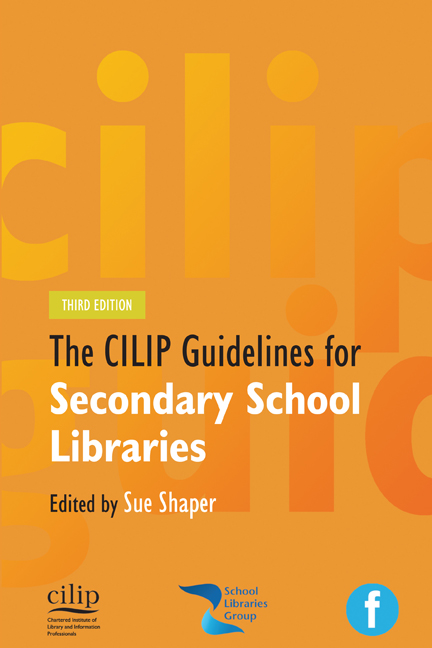Book contents
- Frontmatter
- Contents
- Foreword
- Key recommendations
- Introduction
- Notes
- Abbreviations
- 1 The school librarian and learning: CILIP's vision
- 2 Staffing and management
- 3 Policies and planning
- 4 The library environment
- 5 Management of learning resources
- 6 Information literacy
- 7 Developing students as readers
- 8 Marketing, promotion and advocacy
- 9 Evaluation
- 10 Partnerships
- References
- Appendices
- Index
1 - The school librarian and learning: CILIP's vision
Published online by Cambridge University Press: 08 June 2018
- Frontmatter
- Contents
- Foreword
- Key recommendations
- Introduction
- Notes
- Abbreviations
- 1 The school librarian and learning: CILIP's vision
- 2 Staffing and management
- 3 Policies and planning
- 4 The library environment
- 5 Management of learning resources
- 6 Information literacy
- 7 Developing students as readers
- 8 Marketing, promotion and advocacy
- 9 Evaluation
- 10 Partnerships
- References
- Appendices
- Index
Summary
CILIP recommends that the school recognizes the school library and the librarian as essential in supporting teaching and learning. This means that:
• the school library is an independent, academic department
• the school librarian is head of that department
• the school library is a whole-school resource
• the school library is an inclusive service.
Introduction
Since the last edition of these guidelines (Barrett and Douglas, 2004) there have been unprecedented changes in all sorts of technologies which, in turn, have altered the way we think about education, particularly in the debate surrounding how our young people should learn and what learning looks like in the 21st century. At the moment, we are preparing them for jobs that may not yet exist and for a world that has never before been so connected; one that will become even more connected in ways that we cannot even dream of as yet. This has led to some questioning of the value of having a school librarian and library, when everything is freely available on the internet without apparently requiring the mediation of a librarian. However, as the discourse on pedagogy changes and widens to include evidencebased learning, independent and collaborative learning and guided inquiry, libraries will become a ‘learning commons’ (Loerstscher et al., 2011) where librarians are no longer just the keepers of books or even gatekeepers in the traditional sense; they will become the people who prepare students for the future we cannot yet see, using tools that have not yet been invented. The service provided will not be restricted to the school day, with a rigid timetable, fixed furniture, selected resources and set patterns of use. Library services will be available all the time and choice of resources, use of space and services will all be flexible and determined by the users’ needs. Now and in the future, the school librarian helps every learner to begin a relationship with the library that should be a lifelong relationship: what happens at school prepares them for what happens at college or university or at work or at the public library.
The changes in technology present challenges but, as the new tools are invented, they are being assimilated into the work of the librarian.
- Type
- Chapter
- Information
- CILIP Guidelines for Secondary School Libraries , pp. 1 - 6Publisher: FacetPrint publication year: 2014



